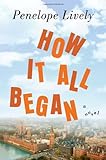 [/amazon_link]Title : How It All Began
[/amazon_link]Title : How It All BeganDame Penelope Lively’s “How it all began” starts off with a violent mugging. A frail old schoolteacher Charlotte Rainsford is pushed to the pavement, while her assailant makes off with her bag. Charlotte is left with a not-too-serious hip injury, but the incident also has repercussions for people around her. She is invited to convalesce at her middle-aged daughter Rose’s home. Rose is thus unable to travel to a conference with her quirky, historian employer Lord Henry Peters, requiring that he call in help from his niece Marion Clark. Marion, having to accompany dear old moneybags uncle Henry, calls off her assignation with married lover Jeremy Dalton, with a quick text message. The text is seen by the wrong pair of eyes. Meanwhile much married Rose gets to meet Anton, a student of her mother’s, and is attracted to him; her husband, by comparison, seems stolid.
Yes, the boat – it is a-rocking! One must, one HAS TO read on!
Knowing of Lively’s previous work, I had expected a good book. What I got was an absolute gem, a pleasure to read and savor. Lively pens a great story, but it is the telling which has me spell-bound. This is a tumultuous story, with it’s ups and downs, and it’s hell-breaking-loose moments, but the author tells it comfortingly, with wit and wisdom and that rare panache of making even the more serious events look amusing. Her characters are sketched with a deep and intimate understanding, and Lively festoons them with their peculiar quirks and eccentricities by and by.
Old age is not for wimps. Broken hip is definitely not for wimps. We are crutch-mobile now. Up and down the ward. Ouch. Sessions with delightful six-foot New Zealand physiotherapist. Seriously Ouch.
Of course before the hip there was the knee, and the back, but that was mere degeneration, not malign interference. The knee. The back. And the cataracts. And those twinges in the left shoulder and the varicose veins and the phlebitis and having to get up at least once every night to pee and the fits of irritation at people who leave inaudible messages on the answer phone. Time was, long ago, pain occasionally struck – toothache, ear infection, cricked neck – and one made a great fuss, affronted. For years now, pain has been a constant companion, cozily there in bed with one in the morning, keeping pace all day, coyly retreating perhaps for a while only to come romping back : here I am, remember me ?
This book is told simply, but her use of certain words is quite unexpected and mirrors her mirth; the author’s very own private nudge-nudge, wink-wink to her readers (I am laughing out loud as I read) :
She [Marion] respects him, too, he is something of a grand old man, no question; she has not been above dropping his name from time to time. If only he would let her do something about the Landsdale Gardens house; every time she goes there she shudders at that fearful old chintz sofa, those leather armchairs, the murky brown velvet curtains. As for the kitchen . . .But Henry dismisses the least proposal of change; Marion has not been able to infiltrate so much as a cushion.
Her pace, even when she is describing events of immediacy, is deceptively moderate. There is always action happening, but it is interspersed with philosophical musings on a variety of life’s situations – age, love, passion, money, hurt, shame, the need for approval. Lively writes in the third person, and we get to hear of other characters via their voices and experiences. Characters ponder and act and we can hear them think.
Stella dithers. She is in a state of acute dither – no, terminal dither. She reads Jeremy’s card again, puts it into the waste bin, retrieves it, returns it to the dresser. She reads it once more, is going to tear it up this time, put a stop to this silliness; she reads again, twitches her head from side to side, does not tear it up.
Lively takes her time telling this tale. Events happen, but they don’t happen in isolation. We also are privy to the people and the happenings around that event – the lead-in, the aftermath and it’s repercussions. This careful construction gives the book depth – it is like being there and knowing these people intimately. Her descriptions give them personality; to me, immersed in this book, they are living-breathing, full-bodied people. The characters in this book are ordinary, everyday people and the tale is of common-place everyday happenings ; people get mugged everyday, hearts are broken, and infidelities bloom anew. But to take these characters and these happenings and tell a tale like this, is rare. “How it all began” is a rare and accomplished novel, by an author well-versed in the language of life.
I can compare my experience of reading the book to watching the sea come in gently on the high tide; there is no immediate rush (although you know it is coming), and it comes in with such grace and beauty that you watch mesmerized even as the water laps your toes.
“How it all began” is the near-perfect contemporary novel; it has all the elements which make a great book, in just the right quantities, and then some. So, pick your favorite spot on that cushy, well-worn, yet-handsome sofa, and settle in for a languorous read – this brilliant book awaits.


[…] Pure by Juliana Baggott (Read) 2. How it all Began by Penelope Lively (Reviewed here) 3. The Golden Scales by Parker Bilal (Currently reading) 4. Last Chance Beauty Queen by Hope […]